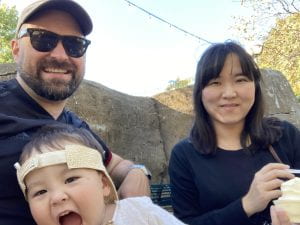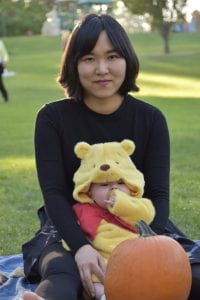– by Emma Snyder, LTS student
Special guests Jiyoon and Chris join us 6 years later to update us on their lives in language education after LTS.

Chris, Jiyoon, and their son enjoying a break at the STL Zoo
Jiyoon: Hi, I’m Jiyoon Lee, and I am a LTSler from 2017. I’m originally from South Korea but have been here in the US since 2016.
Chris: I’m Chris Meierotto, and I graduated with Jiyoon in 2017. I’m originally from Colorado, but I spent some time gallivanting around Europe and South Korea studying language and teaching English until I met Jiyoon a decade ago.
Jiyoon: I was his Korean teacher in Seoul at that time.
Chris: That’s right, lol. I was teaching EFL in a Korean public school when I decided to take some Korean classes to help make life more accessible, and it turned out that she was my teacher. A decade later and here we are.
How has life been for you since finishing the LTS program?
Chris & Jiyoon: Busy.
Jiyoon: After graduating from the LTS program, I applied for Korean teaching jobs in the States. To tell you the truth, at first, it was a slow process and I started to become impatient, but within a few months after graduating, I started to get interviews and a few offers. I decided to accept an offer at UC Berkeley. Chris and I moved down there in 2018, and I worked as a lecturer in their Korean program until the pandemic hit. My specialty at Berkeley was with first-year and heritage learners. Working at Berkeley was a great experience. It gave me an understanding of how language programs function in higher education in the US. We found out we were pregnant in Nov 2019, and shortly after that, the pandemic hit. I decided to take some time off and be with my newborn for a year, and that year was a good break. I got to stay at home with both our baby and Chris for most of the pandemic. I also finished and submitted my first publication to the Journal of Korean Linguistics during that time. In 2021, one of my former colleagues connected me with the Korean program coordinator at Washington University in Saint Louis (WashU). I was able to fill an opening, and I’ll be starting my third year here this fall.
Chris: I was so proud when Jiyoon started getting offers from famous schools and gladly followed her down to the Bay Area. The Bay Area was a great place for me to gain a lot of experience in a short time. Life there certainly isn’t cheap and at one point after our son was born, I was working four jobs to make ends meet. I was teaching in an intensive English program, adjuncting at Berkeley, coordinating a citizenship program at a non-profit, and examining for one of the major international English language assessments. The hustle was real, but each of those jobs taught me so much. They also helped put my LTS training into action.
The IEP I taught for was an open enrollment private academy- I was teaching a six-hour intermediate ESL class four days a week. With the open enrollment model, the course had no clear start or end and just perpetuated itself for the three years I worked there. During the pandemic, the course blended with an advanced one, so I got to work with the same students for nearly three years. That type of intensity forced me to look back on my LTS training in planning. By working with students so intimately in that capacity, I began to critically think about how to connect the language aspect with the students’ real-world experience. There were a lot of incidental lessons based on student needs; everything from writing police reports and asking landlords for extensions to drafting statements of purpose and negotiating when buying cars. I still communicate with that group regularly.
At UC Berkeley, I was able to jump into their Summer English Language Studies program where I designed and taught three courses; an academic writing one, a grammar and academic language writing one, and one called “The Science of Innovation”. I used some materials I created in the LTS program as part of my application at Berkeley.
At the non-profit, I was involved in teaching academic ESL, and I helped develop programs for trafficked youth, for nurses and medical professionals, and also for hospitality workers. I also got my hands dirty with some grant writing there, and in 2020, our proposal was awarded a $250,000 federal grant for an ESL citizenship program. I coordinated and piloted its first iteration before leaving California in 2021.
My favorite experience in the Bay Area was getting my foot in the door to become a certified examiner for that language proficiency test. My MA from the LTS program qualified me for the position, and after some rigorous training, I passed the certification and have been going strong ever since. I must have interviewed at least 7,000 face-to-face candidates since starting to examine in 2019. I’ve definitely read over 100,000 exams in my tenure as well. During the pandemic, the writing examination portion of the test moved to a remote one which is something that I continue doing today.

Jiyoon’s son’s first Halloween in California
Jiyoon: I know it sounds like all we do is work, which is true, but we’ve also done some traveling. We’ve been back to Korea twice since graduating. We’ve also been to quite a few National Parks; Crater Lake, Yosemite, Sequoia, Lassen, Redwoods, Yellowstone, Grand Tetons, the Great Smokey Mountains, Mammoth Cave, and we’re heading to the Great Sand Dunes, and maybe Rocky Mountain in Colorado in May.
Chris: With academic jobs, it’s pretty common to move around quite a bit until you get enough experience or have the right credentials to where you can find a good opportunity and kind of settle down. Having to move across the US a few times has given us great opportunities to see the natural beauty of this country.
Jiyoon: We also love being parents. It’s so amazing watching our son grow and develop by the day. We’re raising him to be bilingual, and he’s getting the hang of both languages and he knows which one to use with whom. It’s so cool!
What are you currently doing within the field of language teaching?
Chris: I am still examining writing and speaking for that test. I rate writing samples from home and travel to Chicago on weekends once a month to conduct speaking exams. I’m contractually bound not to say which exam I work for, but it’s captivating work with a lot of responsibility. Test candidates use the scores I give them to apply for universities in English-speaking countries and visas across the commonwealth. I have a huge ethical responsibility to be accurate and give each exam my full consideration because giving a wrong score could derail a person’s life and ambitions. Interviewing that many people and reading that many exams have given me a lot of insight into the human condition. What started as a side gig turned out to be a full-time one and I’m humbled by it. What I learned in the LTS assessment course helped me discover this career path and it also helped me interview competently for it.
Examining isn’t my only job. I was also able to jump in as an adjunct at a few departments at WashU as well. I teach in five schools at WashU; engineering, medical, architecture and design, law, and arts and sciences. I don’t teach those subjects, but I do teach English and writing. I work with international graduate students and post-doc researchers. I’ve had to push myself hard to learn how to teach legal and technical writing and to help students improve presentations in science, medicine, and engineering. The work that these students and postdocs are working on is often mind-blowing, and I’m glad I can provide them with the English language support needed for their university acculturation and professional development. At WashU, I also am helping develop courses that feed into a certificate program for their English Language Program. We’re also working on a few projects there and am excited about some new directions that it’s moving in. I volunteer for TESOL as a conference proposal reader as well.
Jiyoon: I am teaching in the Korean program in the Department of East Asian Languages and Cultures at WashU. I teach 1st through 3rd year Korean. It’s a big and intensive program here, and the lower-level courses are taught via a coteaching model. It’s a lot of work planning and innovating, but it’s fun. I am also the program’s student engagement and activities coordinator. I’ve been planning and organizing department and campus-wide events that engage students in learning about traditional and contemporary Korean language and culture. Since coming to WashU, I’ve participated in some conferences, too. I have presented at a few here on campus, and I am planning on presenting at next year’s AATK conference. Also, after hearing from Chris how much fun being a language assessor is, I’ve decided to pursue my ACTFL OPI assessor certification for Korean later this year.
Looking back at your time in the LTS program, what is an important takeaway or lesson that your time at UO gave you?
Jiyoon: I was fortunate to have the opportunity to teach Korean as a GTF at UO. I also took electives within the Korean department. These opportunities helped me tremendously with my career path. If you want to work as a GTF or take courses within your chosen language, do it! UO has many great resources and opportunities available that complement the LTS program.
Chris: During the LTS program, you focus so much on your work that you don’t always get to see what your cohort is working on at the moment. When it comes time for the cohort to defend their terminal projects, you suddenly see how truly diverse, amazing, and inspiring their work is. I am still humbled from watching Joline Adams, one of the 2017 cohort, present her work on Ichishkíin and place-based maps.

Chris on his way to Alcatraz Island in SF
Do you have any advice for current or future LTS students?
Jiyoon: The LTS program provides the perfect climate for a supportive and diverse cohort. Embrace diversity and contribute to that support system. It will enrich your experience.
Chris: The LTS program is intense. You learn a lot in a short period. If you are a novice teacher, you will competent upon completion. If you’re an experienced teacher, you’ll be able to explore new avenues and enhance your teaching and find your passion. If you’re a linguist, you’ll be able to put function into pedagogical practice. Everything in the program is an exercise that sets you up for a successful career in language teaching. Take advantage of that and tailor your projects towards your future career goals. Diversify your projects under an overarching theme. Attend conferences and present at symposiums. Treat your coursework as a portfolio and consider how to create a story with it; doing so will help you when applying for jobs. It will also give you a clear focus.